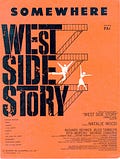Dear Spark Zen readers, Please forgive my Sunday Spark silence. The first few weeks of the ango (a 90-day, monastic intensive) is always a busy time for us. Since I have yet to finish my new post, I thought I’d repost this one from two years ago. Unfortunately, the world is still at war. And this outer state, reflects the inner state of our collective human consciousness. Peace from the monastery, Rev. Shōren Heather
A while back, when I was at home, I decided to watch Steven Spielberg’s re-visioning of WEST SIDE STORY. I was probably 12 when I first watched the 1961 film on our TV set. I was already a huge fan of musicals by then, especially if Gene Kelly was the hoofer! As a young girl, I was captivated by the energy, the music, the dancing, and the tragedy of the star-crossed lovers Tony and Maria. I have watched this film too many times to count. I also saw the 2009 play on Broadway with Spanish-speaking actors and with Spanish woven into the libretto—Spielberg also did the same.
When you're a Jet,
You're a Jet all the way
From your first cigarette
To your last dyin' day.—‘‘Jet Song,” lyrics by Stephen Sondheim
It wasn’t until I was studying Shakespeare in high school that I learned that the film was based on “Romeo & Juliet.” More than 400 years have passed since Shakespeare penned her most famous play, and more than 40 years have passed since I first watched its modern retelling on TV. I wish I could write that Spielberg’s film is a coda signaling the end of tribalism. Instead it’s a cinematic reminder of the pernicious persistence of The Three Poisons: greed, hatred, and delusion.
Greed and hatred stem from our delusive perceptions of reality. We misperceive conditioned phenomena as permanent, discrete objects that exist outside of ourselves. We hold the false belief that we own and control these fleeting phenomena—including our body-minds. We mistakenly extend our identity to these “possessions” thinking that they are who we are and owning them will make us happier and worthier than other people.
The discriminating mind further wreaks havoc by making moral judgments about human beings based on superficial characteristics, such as: ethnicity, skin tone, religion, socio-economic status, clothes, gender, etc. Based on these splinters created by the mind’s (false) eye, we decide who’s worthy of our love and compassion; who deserves food, potable water, shelter, healthcare, and an education; who belongs to our tribe and who does not. When we protect our tribe, we inadvertently or intentionally neglect, reject and harm the “others.”
One of my most vivid memories of feeling the sting of not belonging was in my senior year of high school. It was October 1984 and me and three of my friends wanted to celebrate our friend Rhonda's early admission acceptance into Harvard University. We drove to the Häagen-Dazs in the Village of Bronxville, a wealthy white enclave about two miles north of our decidedly less wealthy and more culturally diverse hometown of Mount Vernon, NY.
After getting our ice cream, we settled into our booth and chatted excitedly about the prospect of Rhonda's attending Harvard. She was the only person in our graduating class of 500+ students who was heading to this elite Ivy League school. Though there were a few people heading to MIT, Stanford, Columbia, & Georgetown. We were all so proud of Rhonda. At some point, we noticed a group of teenage girls in the booth behind ours, sneering and snickering at us. In the slang of our day, these girls were dissin' us.
Their derisive laughter and comments, meant to be overheard by us, riled us up until the point where Rhonda opened her purse, extracted her Harvard University student ID card, and turned and faced our tormentors. She shoved the card into their space and said with as much disdain and smugness as she could muster: "Harvard F**king University. Read it and weep." They were stunned into silence, and then we were the ones who were gleefully snickering.
When they left, we decided to jump in Traci’s car and follow them. We weren’t able to keep track of their car, and we found ourselves driving down some random street. There were palatial houses on one side and a tree-lined park on the other. The yards were gorgeously manicured; the houses were dramatically lit; and since it was almost Halloween, there were Jack O'Lanterns decorating the front stoops. We thought we recognized the girls' car parked in a driveway and stopped.
Traci stayed in the driver’s seat with the car idling while the three of us got out and smashed the pumpkins. Snuffing out the flickering candles inside and smearing seeds, slimy fibrous membranes, and orange squash flesh on the steps and sidewalk. We then hopped back into the car, giddy and smug as we drove off into the dark.

Coming of age in the 1980s, in the ecosystem of my family, school, and neighborhood, I would not have used the words "racist" or "classist" to describe the girls. I would have called them "snobs." What were the markers that told these snobby girls that it was okay to treat us as "other?” Skin color, as it still is today, was the most visible marker: Rhonda was black; Traci’s mother was from Japan and her father from Spain. Anna and I, because our skin was white, would have probably blended in more had we been on our own. But the markers of class might have shone through anyway: our accents, our demeanor, and our clothes signaled that we did not belong to their wealthy, white, pedigree culture.
Because I was self-conscious about being working class and because I was white-bodied, the snobby girls’ racism didn’t register with me. I don't ever recall speaking to my friends about how we felt that evening. There was no need to. In the moments where we were being insulted and othered, our bodies knew it. We did not have to name it. We belonged to each other. And we knew beyond words that we had transgressed by stepping inside a circle where we were not welcome.
Had you driven by while we were smashing the pumpkins you probably would have called us hoodlums and maybe even called the police. Because you had not witnessed how we were shamed and othered just moments before. You might have had less empathy because you had less information. You just saw the result, but not the causes. Had you known about our personal struggles on a daily basis with racism, sexism, and classism, maybe you would have had more empathy.
And, had you been a practicing Buddhist at the time, perhaps instead of judging us, you would have taken the backward step and shone the light on your own past behaviors: the times when you were enraged, the times when you acted out, the times when you were not able to stay open, present, and calm with the causes and conditions arising in your life. Maybe you had never smashed pumpkins in your life; maybe you drank too much or worked too much or maybe you were cheating on your spouse. These are the acceptable coping mechanisms of dealing with anger, despair, and oppression in the culture of our white-bodied, capitalist, and patriarchal society.
And, had we as teenagers been taught to pause, reflect and remain calm while the snobby girls mocked us, then maybe we would have wondered: Why are they acting out? What negative beliefs had they internalized? How had their sense of entitlement and superiority caused them harm? If they were scorning us, who had belittled them? If they had been taught to truly love themselves, if their internal culture was one of peace and integration, then they would not have to puff themselves up by putting us down.
When we smashed the pumpkins, what were we really smashing? We were raging against those snobby girls' voices telling us we don't belong, that we're not good enough, that we need to stay in our place. And, we were also smashing our own internalized voices telling us the same. What Dr. Martin Luther King, Jr. calls "the internal violence of the spirit." In his book Healing Resistance, the Buddhist peace activist Kazu Haga describes this internalized oppression as the "messages from oppressive systems and worldviews about our inferiority [taking] root inside our own minds until we start believing in our inferiority."1 These beliefs become part of our internal heart-mind-body culture—our karmic conditioning—and continue to be reinforced and perpetuated by our global society.
As I write these words, there are many wars raging around the world, and because of these conflicts, there are more than 26 million refugees, half of whom are children. The UNHCR estimates that 82.4 million people have been forcibly displaced from their homes. Dependent co-arising means that we are all responsible in some way for the death, destruction, and division in the world.
Millions of our brothers and sisters are displaced from their homes because our heart-minds are alienated from our True Nature. This is the original sin of separation: the universal schism that afflicts us all to a greater or lesser degree. Other words to describe “schism” are "fracture" and "disunion," which speak to our internalized oppression. We project our unexamined beliefs and unresolved internal conflicts onto “external” circumstances. These false ideas and unhealed wounds then become the "culture" of an institution, a society, a country, a religion—of a tribe called the Jets or the Sharks.
I know that we're not supposed to have goals (well, at least not be attached to them) in Zen; however, for me, the goalless goal of being a Zen practitioner is "disturbing the complacency" of my internal culture. What are the schisms in my heart-mind that cause me to harm myself and others? How can I disturb the complacency of my white-bodied privilege, of my college-educated mind? Of being a Zen priest who lives a comfy life in a beautiful Zen center where all of my essential needs are met?
Although zazen and the Buddha’s teachings help us bear compassionate witness to our internal schisms, the injustices of society won’t transform unless we do the hard, messy work of investigating and healing our inherited karmic conditioning. Otherwise we will continue to experience the suffering of separation—of the –isms we create and identify with.
After the Sharks and Jets rumble, leaving their respective leaders’ Bernando and Riff dead, the star-crossed lovers Tony and Maria (in the 1961 film) sing “Somewhere.” It’s a beautiful song that speaks of forgiveness, understanding, and finding a home where there’s “peace, quiet and open air.”
Somewhere
There's a time for us
Someday a time for us
Time together with time to spare
Time to learn
Time to care
Someday, somewhere
We'll find a new way of living
We'll find there's a way of forgiving—“Somewhere,” lyrics by Stephen Sondheim
When we truly feel the profound and eternal presence of Buddha Nature—God, Christ Consciousness, Allah, Brahman, Yahweh, Wakan Tanka [“The Great Spirit” in Lakota]—there will no longer be refugees. Our hearts will be the home where all tribes are welcome.
Haga, Kazu. Healing Resistance. Berkeley, CA, Parallax Press. 2020.





I read this strong, light-bearing piece on October 14/24 -- Thanksgiving Day here in Canada. I've lived for 79 Thanksgivings so far, not counting the one when I was carried within my mum. Today, I am especially grateful for the long view of our uneven evolution into increasingly humane awareness -- and equally for the vibrant immediacy of Now, the 'time' when so much kindness and support arises spontaneously from one human toward another or among others, drop-by-drop, nourishing the way on behalf of us all.
Glad to be here still, on our earth, one-blessed-breath-at-a-time.
Thanks you for choosing this fine re-run to share this weekend in '24, Rev. Heather. 😌 📿 💚